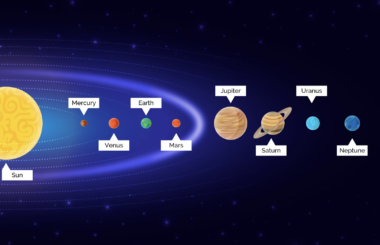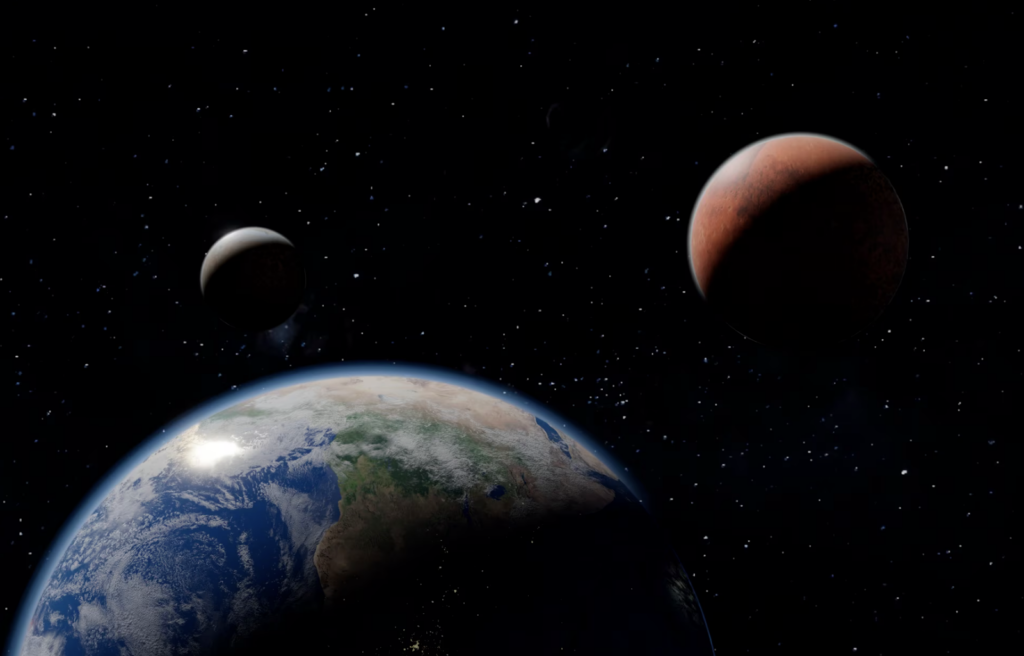What Is the Acronym for Remembering the Order of the Planets?

The solar system is a vast and awe-inspiring place, and at its heart lies a lineup of remarkable celestial bodies we call planets. But when it comes to recalling their order in the grand scheme of things, it's easy to get lost among the stars. Fortunately, there's a handy acronym that has been a mnemonic lifesaver for generations of space enthusiasts.
Meet the Solar System's Lineup
Before we dive into the acronym that simplifies the task of remembering the order of the planets, let's take a moment to meet these fascinating celestial neighbors. Our solar system, like a cosmic family portrait, features an intriguing cast of characters, each with its unique characteristics and allure. As we journey from the sun outward, here's an introduction to the eight planets that make up our celestial community:
- Mercury: Picture a scorching-hot, rocky world, the closest to the sun. Mercury's surface experiences extreme temperature swings, with daytime highs that could melt metal and frigid nights that rival the coldest winters on Earth;
- Venus: Known as Earth's "sister planet," Venus boasts an inhospitable environment, with a thick, choking atmosphere and surface temperatures that could melt lead. Its beauty lies in its enigmatic cloud cover, which conceals the surface below;
- Earth: Ah, our home sweet home! The only known oasis of life in the universe, Earth dazzles with its diverse landscapes, teeming ecosystems, and the rich tapestry of human civilization;
- Mars: The "Red Planet" has long beckoned human exploration with its rusty, iron-rich surface. It's a world of stark contrasts, from the towering volcanoes of Olympus Mons to the intricate channels carved by ancient rivers;
- Jupiter: The behemoth of the bunch, Jupiter is a gas giant with a personality that matches its size. Its mesmerizing cloud bands, raging storms, and iconic Great Red Spot make it a favorite target for telescopes;
- Saturn: If you thought Jupiter was a showstopper, meet Saturn, the lord of rings. This gas giant is famous for its stunning ring system, composed of countless icy particles that encircle the planet in a mesmerizing dance;
- Uranus: An ice giant with a touch of whimsy, Uranus spins on its side, making it unique in the solar system. Its pale blue hue and icy composition invite curiosity and exploration;
- Neptune: The solar system's distant wanderer, Neptune, is an icy giant enshrouded in mystery. Its deep blue color and tumultuous atmosphere hint at the captivating secrets hidden beneath its thick clouds.
Now, let's embark on a cosmic journey to remember their order with the help of a clever acronym.
My Very Educated Mother Just Served Us Noodles
That's right; the acronym you might have learned in school is "My Very Educated Mother Just Served Us Noodles." Each word in this sentence corresponds to the first letter of a planet, arranged in order from the sun outward. Here's how it breaks down:
- My: Mercury;
- Very: Venus;
- Educated: Earth;
- Mother: Mars;
- Just: Jupiter;
- Served: Saturn;
- Us: Uranus;
- Noodles: Neptune.
This clever sentence not only helps you remember the order of the planets but also adds a touch of humor to your cosmic knowledge.
Cosmic Memory Tools: Beyond Mnemonics
The use of acronyms as memory tools isn't just about rote learning; it's a practical way to make the study of our solar system more accessible and enjoyable. These creative aids serve as helpful guides for space enthusiasts of all ages, particularly young learners who are embarking on their exploration of the cosmos.
Engaging Young Minds
Imagine a classroom filled with curious students eager to uncover the secrets of the universe. While the vastness of the solar system can be overwhelming, a clever acronym like "My Very Educated Mother Just Served Us Noodles" can transform a mundane lesson into an exciting cosmic adventure. It takes a simple list of planets and turns it into a memorable phrase that young learners can grasp, making education both entertaining and effective.

Alt:
The Evolving Acronym
Similar to constellations that change position in the night sky, these memory aids have also seen evolution. Various versions of the acronym have surfaced, each with its unique twist. Some enthusiasts might replace "Noodles" with "Nachos" or perhaps "Nectarines." This personalization adds a touch of fun and individuality to the memory aid, enhancing its memorability.
This phenomenon showcases human inventiveness and our enduring fascination with space. Whether it's noodles, nachos, or nectarines, the essence remains the same: a mnemonic device that guides us through the order of the planets in our solar system, one step at a time.
So, the next time you come across a young astronomy enthusiast learning about the sequence of planets, or even an experienced space aficionado seeking a cosmic twist, remember that these acronyms aren't just memory tools; they're companions on our celestial journey, helping us unravel the marvels of the universe.
Beyond Pluto
Now, you might be wondering about Pluto, the former ninth planet that was reclassified as a dwarf planet in 2006. While Pluto is no longer considered one of the primary planets in our solar system, it's still a fascinating celestial body. You can remember its order with a modification of the acronym:
- My: Mercury;
- Very: Venus;
- Educated: Earth;
- Mother: Mars;
- Just: Jupiter;
- Served: Saturn;
- Us: Uranus;
- Nachos: Neptune;
- (and) Pluto: Pluto.
This extended version includes Pluto as a bonus member, acknowledging its place in the hearts of those who grew up learning about the "nine planets".
So, whether you prefer your planets served with noodles, nachos, or nectarines, this handy acronym is your ticket to remembering the order of the planets and exploring the vast reaches of our solar system with ease.
In Conclusion: Navigating the Cosmic Order
As we wrap up our cosmic journey through the realms of memory aids and planetary lineups, one thing becomes clear: our fascination with the universe knows no bounds. The mnemonic acronym we've explored, whether it's "My Very Educated Mother Just Served Us Noodles" or one with a unique twist, is a testament to our creative ingenuity and our relentless quest for knowledge.
While these memory tools may seem whimsical, they serve a crucial purpose. They transform the abstract sequence of planets in our solar system into something tangible, engaging, and memorable. They light the way for young learners, inviting them to explore the wonders of space with enthusiasm.
But beyond the acronyms lies the grandeur of the cosmos itself—a tapestry of planets, moons, stars, and galaxies that continue to captivate and inspire. The order of the planets, as we've come to know them, is just the beginning of our journey into the mysteries of the universe.
So, whether you remember "Noodles," "Nachos," or something entirely different, let these memory aids be your cosmic companions. They make navigating the solar system's order not just educational but also enjoyable. And as we gaze at the night sky, let's be reminded that there's always more to discover in the vast expanse of space.